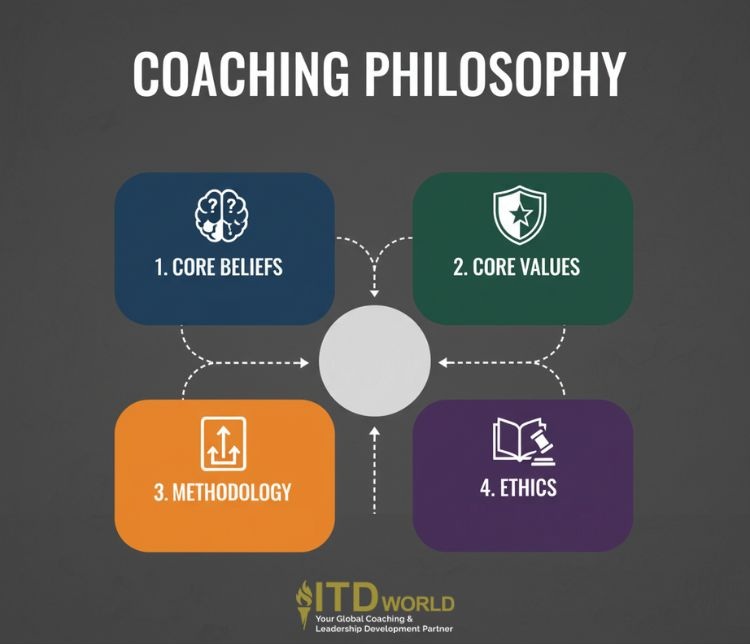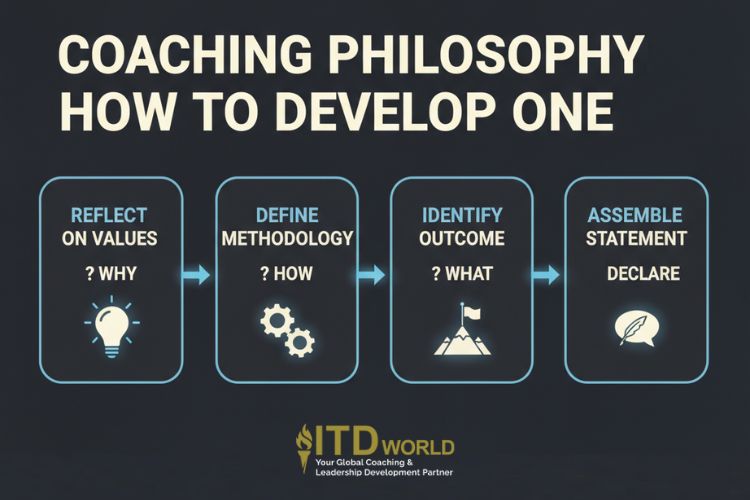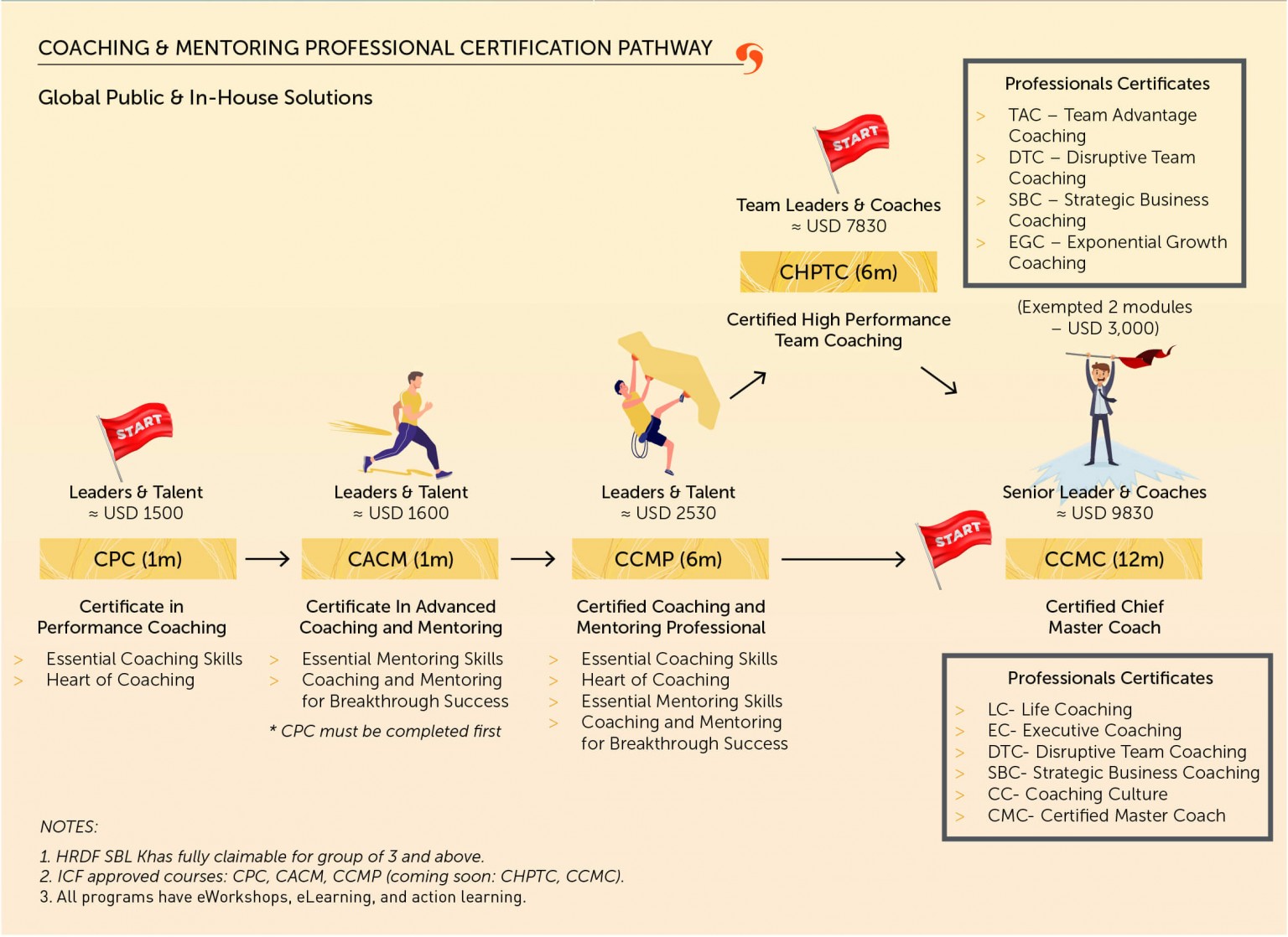Check out a practical guide to developing your coaching philosophy and ensuring alignment between your practice and deepest principles.
What separates a good coach who knows the right techniques from a truly great one who facilitates transformation? The difference lies in a clear, authentic, and consistently applied coaching philosophy. Rather than an academic exercise, it is a coach’s “internal compass” – the foundational belief system that guides their every question, action, and decision, allowing them to coach with integrity, purpose, and profound impact.
|
Author: Jonathan M. Pham |
Highlights
- A personal coaching philosophy is a concise statement that articulates your core beliefs about human potential, your fundamental values as a coach, and your unique methodology for guiding clients; it serves as the foundational “operating system” for your coaching practice.
- Having a personal philosophy is crucial for coaches – it provides a consistent anchor for their actions, builds trust with clients, guides difficult decisions, and defines their unique value proposition in a competitive market.
- A robust coaching philosophy should address four key areas: core beliefs about people and change, core values, unique methodology, and ethical boundaries; additionally, it also needs to be authentic, client-centered, and actionable.
- Developing a coaching philosophy involves a four-step process: uncovering your “why” (beliefs and values), defining your “how” (methodology), articulating your “what” (desired client outcomes), and then assembling these insights into a concise, actionable statement.
- Living a coaching philosophy presents challenges such as falling into the “expert” trap, becoming overly rigid, or developing a “say-do” gap, which can be overcome by disciplined commitment to one’s process, adaptability to client needs, and consistent self-reflection and accountability.
What is a Coaching Philosophy?
A personal coaching philosophy is a concise and explicit statement that outlines your core beliefs about human potential, your foundational values as a coach, and your unique methodology for helping clients realize their goals. It is the synthesis of your “why” (purpose and beliefs) and “how” (high-level approach to coaching).
Think of it as your personal “user manual.” It is a declaration of who you are as a coach and what a client can expect when they partner with you. As such, it provides an anchor for your decisions, ensuring that what you do is not just a series of random techniques, but a consistent and integrated practice rooted in a solid foundation.
It’s worth noting that there is a crucial distinction between the two terms “coaching philosophy” and “coaching style”. The former can be compared to the operating system (OS) on your computer – it’s the foundational, stable framework that runs in the background. On the other hand, the latter is like the different software applications you use – i.e. you might use a directive approach for one task and a non-directive one for another, but your underlying OS remains the same.
| Aspect | Coaching Philosophy | Coaching Style |
| Core Nature | The “Why”: Your core beliefs about people and change. |
The “How”: The specific techniques and behaviors you exhibit in a session.
|
| Stability | Stable and enduring; your foundational principles. |
Flexible and adaptable; changes based on the client and situation.
|
| Purpose | To provide an internal compass and ensure consistency for the coach. |
To meet the specific, in-the-moment needs of the client.
|
| Example | “I believe every client is creative, resourceful, and whole.” |
“Using the GROW model” or “Asking powerful, open-ended questions.”
|
The Importance of Having a Coaching Philosophy
People don’t care how much you know until they know how much you care.
Theodore Roosevelt
Developing a personal coaching philosophy is more than a branding exercise; it is a critical practice that directly impacts a coach’s effectiveness, their clients’ success, and the integrity of their practice. A clear philosophy serves as both a stable anchor for the coach and a powerful differentiator in the marketplace.
- Provides an anchor for consistent action
A coaching session – especially one that involves successful people such as C-suites or those who suffer from chronic interpersonal issues – tends to be dynamic and unpredictable. Having a clear philosophy is like holding on to an anchor; it ensures your approach remains consistent and principled, thereby creating a reliable and comfortable experience for your clients.
- Builds unshakeable trust
Trust is the absolute bedrock of any successful coaching relationship. A transparent philosophy allows people to understand how and why you operate, which is the first step in fostering that trust.
The International Coaching Federation (ICF), the global standard for the profession, has long emphasized core competencies such as “Cultivates Trust and Safety.” A well-defined philosophy is a coach’s primary tool for demonstrating their commitment to these ethical standards from the very first interaction.
- Guides you through difficult decisions
Coaching conversations can be complex. A client might be stuck, resistant, or pressuring you for direct advice instead of finding their own. In these challenging moments, a well-defined philosophy (e.g., “I believe people are creative and resourceful”) acts as a decision-making filter that enables you to arrive at the right choice for the individual’s long-term growth, not the easy one in the moment (e.g. asking another powerful question, rather than giving in and becoming a consultant).
- Defines your unique value proposition
In today’s crowded market, a clear philosophy is your key differentiator; it communicates who you are best suited to help and what makes your approach unique, attracting the right people to your practice.
Think of the world-renowned executive coach, Dr. Marshall Goldsmith. His powerful coaching philosophy is encapsulated in the title of his bestselling book, “What Got You Here Won’t Get You There” – which immediately communicates his unique value proposition: he specializes in helping already successful leaders identify and overcome the specific behavioral habits that are limiting their future potential. This clarity attracts exactly the right clients and sets powerful expectations for the coaching engagement.

Coaching philosophies of famous coaches
Components of a Good Coaching Philosophy
Typically, a robust coaching philosophy should address the following four key areas:
-
Core beliefs about people and change
The foundational assumption you hold about your clients’ capabilities. It answers the question, “What do I believe is true about the people I coach?”
Example: A common belief in professional coaching is that every client is “naturally creative, resourceful, and whole.” Adopting it means your job is not to “fix” the client, but to enable them to access their inner wisdom and find answers they already possess.
-
Core values
The basic ethical principles that guide your conduct in every session. They answer the question, “What do I stand for in my practice?”
Example: A coach might identify their core values as Confidentiality, Courage, and Compassion – which serve to guide their behavior, especially when navigating challenging client situations.
Read more: Leadership Values – 10 Qualities for Exceptional Results
-
Unique methodology
The high-level approach or process for facilitating change and growth. It answers the question, “What is my general model for partnering with a client?”
Example: A coach may describe their methodology as, “I partner with clients to first raise their awareness through powerful questioning, then we co-create actionable strategies, and finally, I provide the accountability needed to drive momentum.”
-
Ethical boundaries
A personal philosophy must be grounded in the professional ethics of the coaching industry – so that your practice is not only effective, but also safe, responsible, and credible. For professional coaches worldwide, the ICF Code of Ethics serves as a reference source of guidelines on professional conduct, conflicts of interest, and, most importantly, the unwavering commitment to client confidentiality.

Working on the above-mentioned components is the first step. That said, for it to truly work, your philosophy must also pass the following simple three-part test:
- Is it authentic?
It must be a genuine reflection of your true self, experiences, and values – not what you think a coach should believe.
- Is it client-centered?
While the philosophy is personal to you, its ultimate purpose must be to serve the client’s growth and success – NOT to make you look smart or feel powerful.
- Is it actionable?
In other words, it must be a practical guide for your real-world coaching sessions. An abstract philosophy will not help you decide what question to ask next or how to navigate a difficult conversation.
Read more: 10 Characteristics of a Good Coach
Developing a Coaching Philosophy: A Step-by-step Guide
-
Uncover your “why” (beliefs & values)
A personal philosophy is not something you invent in a single moment, but something you discover through a process of deep self-reflection. It already exists within you, shaped by your experiences, values, and beliefs.
The key to developing a coaching philosophy is to be clear about your core motivation and the principles that guide you – by asking yourself these questions:
- Why did you choose to become a coach or adopt a coaching style? What is the unique impact you hope to have on others?
- Think about a time when you felt most proud of a coaching or mentoring interaction. What core values were you honoring in that moment (e.g., courage, integrity, compassion, growth)?
- What do you fundamentally believe is true about people’s capacity for change and their innate potential?
-
Define your “how” (methodology)
Next, it’s time to articulate your high-level approach to facilitating change. Rather than listing every technique you know, what is important is to describe your general process for partnering with a client:
- How do you best help people acquire new perspectives? Is it through challenging questions, creative exercises, or quiet reflection?
- What coaching tools, models, or frameworks (like GROW, appreciative inquiry, etc.) do you naturally gravitate towards and find most effective?
- What does a “successful” coaching engagement look like from your perspective? What happens during the process?
-
Articulate your “what” (outcome)
Moving on to the third step, you need to think about the end result for the person being coached – the ultimate purpose of your partnership, and the lasting capabilities you hope to instill.
- Beyond their initial stated goal, what do you want every client to walk away with after your engagement is over?
- What new mindsets or skills do you hope to help your clients cultivate for their future success?
-
Assemble your coaching philosophy statement
Now, synthesize your insights from the previous steps into a clear, concise, and memorable declaration. A simple and effective structure is:
I coach because I believe [Your Core Belief – from your ‘Why’]. My practice is guided by the values of [Your Values]. I partner with my clients to [Your Methodology – your ‘How’] so that they can achieve [The Ultimate Outcome for the Client – your ‘What’].
Example:
“I coach because I believe that everyone has the wisdom within them to solve their own challenges. My practice is guided by the values of curiosity, courage, and compassion. I partner with my clients to ask powerful questions that unlock new perspectives and co-create actionable plans so that they can achieve not only their stated goals but also a greater sense of confidence and self-reliance.”

Philosophical coaching
Sample Coaching Philosophy Template
Introduction: A Tool for Discovery and Clarity
This template is a guided worksheet designed to help you discover and articulate your unique coaching philosophy. A philosophy is not invented; it is uncovered through reflection. Use this tool to explore your core beliefs, values, and methods to create a statement that is authentic to you and serves as the “true north” for your coaching practice.
Part 1: Uncovering Your “Why” (Your Core Beliefs & Values)
Your philosophy starts with what you fundamentally believe.
1. My Core Belief About Human Potential:
(Complete the sentence below.)
I believe my clients are naturally… (e.g., creative, resourceful, whole, capable of change, seeking growth, etc.)
2. My Core Values as a Coach:
(From the list below, circle the 3-5 values that are most essential to your coaching practice. Then, for your top 3, briefly describe what each value means to you in action.)
| Integrity | Courage | Compassion | Growth |
| Curiosity | Authenticity | Trust | Respect |
Value 1:
In my coaching, this value looks like:
Value 2:
In my coaching, this value looks like:
Value 3:
In my coaching, this value looks like:
Part 2: Defining Your “How” (Your Unique Methodology)
This is about your high-level approach to facilitating change.
Complete the following sentences:
The environment I strive to create in my coaching sessions is one of…
(e.g., psychological safety and trust; high energy and creativity; calm reflection.)
The primary way I help clients gain new perspectives is by…
(e.g., asking challenging questions; using creative metaphors; exploring their underlying beliefs.)
A core part of my coaching process involves…
(e.g., co-creating clear, actionable goals; providing strong accountability; focusing on strengths.)
Part 3: Articulating Your “What” (The Ultimate Outcome for Your Clients)
Beyond their stated goals, what is the lasting impact you hope to have?
Complete the following sentences:
I want every client to walk away from our partnership with a greater sense of…
(e.g., self-awareness; confidence; clarity; purpose.)
My ultimate aim as a coach is to help my clients become more…
(e.g., effective leaders; resilient individuals; authentic in their lives.)
Part 4: Assembling Your Coaching Philosophy Statement (First Draft)
Now, synthesize your insights from the sections above into a single, concise statement.
A simple structure to follow:
I coach because I believe [Your Core Belief from Part 1]. My practice is guided by the values of [Your Top 3 Values]. I partner with my clients to [Your Methodology from Part 2] so that they can achieve [The Ultimate Outcome from Part 3].
Next Steps:
This statement is a living document. Review it, refine it, and see if it feels authentic. The ultimate test is whether you can live by it in every coaching session. For deeper insight and feedback, consider sharing your philosophy with a trusted mentor or a professional supervisor.

Navigating the Challenges of Living Your Coaching Philosophy
A philosophy is only as valuable as a coach’s ability to live by it. Below are a few major challenges that can cause one to drift from their “true north” – plus practical strategies for overcoming these hurdles and staying aligned.
- The “expert” trap
This is the most common pitfall, especially for coaches who are also subject matter experts. A client presents a problem, and your instinct is to jump in and provide the “right” answer, effectively turning the coaching session into a consulting meeting and disempowering the client.
Solution: Maintain a disciplined commitment to your process. When you feel the urge to give advice, pause and look at your written philosophy statement. If it says, “I believe my clients have their own answers,” that is your cue to ask questions instead.
Example: You might catch yourself about to say, “You should do X.” At that moment, stop and say something like, “That’s a fascinating challenge. What are a few options you’ve already considered?” In doing so, you put the work and the power back where they belong: with the client.
Read more: Ego in the Workplace – The Hidden ‘Evil’ Behind Team Dysfunctions
- Philosophical rigidity
A coach may become so attached to a specific model or framework (e.g., the GROW model, a specific questioning technique) that they try to force every client and every situation into that box, even when it isn’t a good fit.
Solution: Remember your philosophy is a compass, not a cage. Its ultimate purpose is to serve the client, not the other way around. In other words, you must be willing to adapt your style and tools to meet the individual where they are.
Example: A coach might plan to use a session to focus on future goal-setting, but then realize their client is dealing with a significant confidence crisis after a recent setback. Instead of sticking to the plan, it’s much better to act out of compassion and set aside the goal-setting framework – so as to first create a safe space for the individual to process their feelings.
- The “say-do” gap
Over time, a subtle drift can occur where a coach’s marketing promises a client-centered, empowering experience, but their actual sessions become more routine or directive. When such a “say-do” gap emerges, it undermines authenticity and trust.
Solution: Being committed to one’s own development as they are to their client’s – by practicing regular self-reflection and seeking external accountability.
How-to: Schedule a quarterly personal review of your coaching philosophy, asking yourself, “Are my recent sessions truly aligned with my stated values and beliefs?” If possible, consider engaging with a mentor coach or a peer supervision group. Presenting a challenging case to trusted peers and asking for feedback on your approach is one of the best ways to ensure you are consistently “walking the talk.”
Read more: Mastering the Situational Coaching Model (SCM)

Coaching Philosophy Quotes
Check out more coaching quotes here!
A coach should never be afraid to ask questions of anyone he could learn from.
Bobby Knight
A coach is someone who can give correction without causing resentment.
John Wooden
It’s the little details that are vital. Little things make big things happen.
John Wooden
The difference between ordinary and extraordinary is that little extra.
Jimmy Johnson
Really, coaching is simplicity. It’s getting players to play better than they think they can.
Tom Landry
The delicate balance of mentoring someone is not creating them in your own image, but giving them the opportunity to create themselves.
Steven Spielberg
Identify your problems, but give your power and energy to solutions.
Tony Robbins
My responsibility is leadership, and the minute I get negative, that is going to have an influence on my team.
Don Shula
We are here on earth to make a positive difference, not to prove how smart or right we are.
Peter Drucker
Become a World-Class Coach with ITD World
At ITD World, we pride ourselves on our reputation as a global leader in certifying the next generation of professional coaches. Our programs are designed to provide you with the world-class skills, tools, and credentials needed to practice coaching with confidence, credibility, and impact.
- Certified Coaching & Mentoring Professional (CCMP): ITD’s flagship program is internationally recognized and designed to equip you with the essential competencies, tools, and ethical framework of professional coaching, providing a solid foundation for your practice.
- Certificate in Performance Coaching (CPC): For those focused on driving business results, this program provides the techniques to enhance team performance, productivity, and visualization of organizational goals.
- Certified Chief Master Coach (CCMC): For experienced coaches and senior leaders seeking to achieve the highest level of mastery, this elite program offers an advanced development path to becoming a world-class coaching expert.
- One-on-one executive coaching: For leaders who wish to experience the transformative power of a coaching partnership firsthand, our expert executive coaches can help you accelerate your own personal and professional growth.
Ready to build your coaching mastery on the foundation of a powerful, authentic philosophy? Contact ITD World today to learn more about our globally recognized solutions!
Other resources you might be interested in:
- 12 Leadership Coaching Topics to Drive Lasting Transformation
- 7 Types of Coaching in the Workplace: A Practical Guide
- Agility Coaching: Navigating Change & Fueling Business Success
- Leadership Philosophy: How to Define Your True North & Follow It
- Talent Philosophy: Unlocking Workforce Potential



